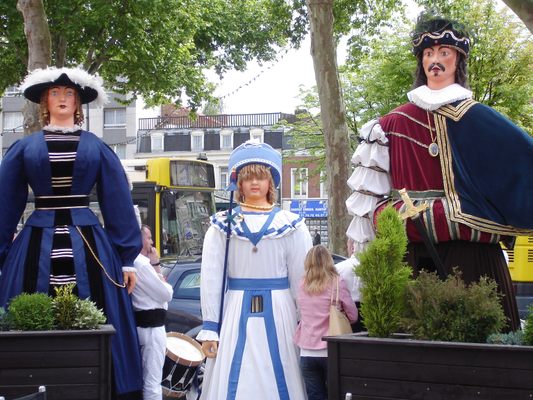About
Every July the streets of Douai in Northern France are taken over by a whole family of giant figures during the Les Fêtes de Gayant, a celebration that has continued for hundreds of years despite being persecuted by everyone from the Nazis to the Catholic church.
The origins of the festival date back to the year 1530 when the then Spanish city of Douai organized a festival to celebrate their defeat of French forces. As part of the festival local bakers and artisans created a massive wicker figure named simply "Gayant" (Giant). While accounts of who the colossal man was supposed to represent differ, Gayant was inspired either by a local lord who saved the city in the ninth century or by the patron of the city, Saint Maurand. Either way the figure was a hit and instantly a new yearly tradition was born.
Gayant's initial appearance was so popular that the next year the locals gave him a giant wife by the name of Marie Cagenon. Over the next hundred years as the festival evolved, the couple was even given children named Jacquot, Fillon, and Binbin. The happy family were paraded through the streets each year to the delight of the citizens, but not everyone was as delighted by the massive figures as the people of Douai.
By 1667 the city had been incorporated into France and the new government was not happy with a festival that celebrated a French defeat. The celebration was cancelled and the gayants were banned. However the festival returned over one hundred years later, gayants and all, until the party was once again outlawed, this time due to accusations of idolatry from the local religious leaders. Never one to stay down for long, the gayants reappeared again around a decade after their latest ban and the festival continued once again. The revelry seemed to finally be safe but during both World War I and World War II, Douai was occupied by enemy forces who once again put a stop to the festival. The Nazi's notoriously burned the city's giant family.
After the end of World War II, the festival was finally reinstated permanently. Today the gayants are represented by fully movable puppets that stand between 27 (Gayant) and 8 (Binbin) feet tall. The two larger gayants take six people to operate and move through the city while the children are simply manned by a single person. The looks of the gayants reflect traditional garb, save Gayant himself who is presented as a warrior knight.
Despite all turmoil during its centuries of existence, Les Fêtes de Gayant was simply too large to keep down.
Related Tags
Published
January 1, 2016
Sources
- http://en.wikipedia.org/wiki/Gayant
- http://www.unitedplanet.org/blog/2009/07/01/the-festival-of-the-giants
- http://www.tourisme-nord.com/offer_reservation/detail/Les-F%C3%AAtes-de-Gayant-DOUAI,/(id)/39a176d0-585b-4ea4-a55d-75d07aedda82,FMANOR059FS01600,52550
- http://traditionscustoms.com/festivals/les-gayants-de-douai





































